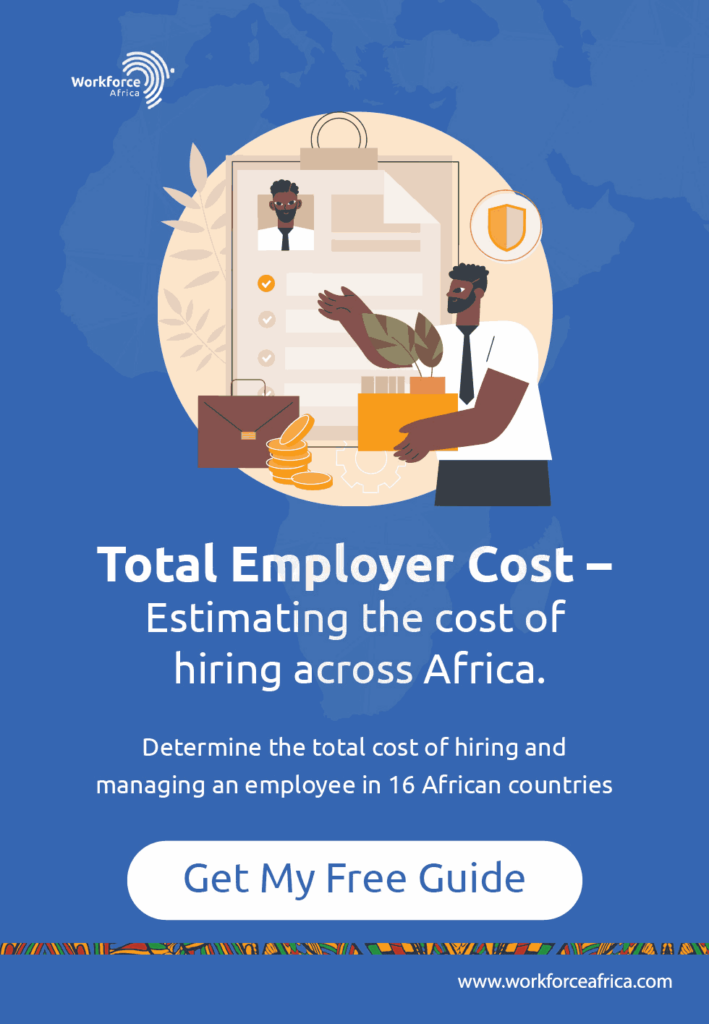
- hello@workforceafrica.com
- +234 816 305 6589
- +234 903 194 6744

In the dynamic landscape of African business, effectively managing payroll presents a unique set of challenges, particularly in the face of intricate regulations and frequent legal changes.
This article examines the innovations for payroll management and outlines the benefits of payroll outsourcing for business growth, with insights on leveraging expert partners for compliance in Africa.
Payroll in Africa is a business activity that can pose significant challenges for global companies,
particularly the countries where business regulations and labour laws are intricate and subject to frequent changes.
This complexity often prompts businesses expanding in Africa to outsource their payroll processes to third-party providers.
Merely outsourcing payroll services is not the ice breaker. Leveraging payroll outsourcing firms like Workforce Africa that demonstrate flexibility and the ability to adapt to the distinctive requirements of each client is a strategic approach every business needs.
A payroll is a comprehensive list of an organization's employees and their corresponding salaries. It is vital for tracking the total amount disbursed to employees and the taxes remitted to the government.
Managing payroll in Africa can be challenging, especially for organizations with a large workforce. Utilizing a robust payroll management system is crucial to these firms.
This system consolidates employee details, financial records, and monthly deductions in one centralized platform.
It is a systematic approach through which employers compliantly handle employee wages, remit taxes, and maintain a record of financial outflows, including deductions, paid leaves, and bonuses.
The payroll management system in Africa maintains an updated database of employees, ensuring accurate documentation of raises and the removal of former employees. Beyond payroll processing,
it generates essential employee-related documents as mandated by regulations.
The significance of a payroll management system extends to:
The payroll management process involves several stages
Pre-payroll
This marks the initial phase in payroll management, encompassing the compilation of essential data required for payroll processing.
The specifics of this data may differ among organizations, contingent upon company policies and regulatory laws. This encompasses:
Following the compilation, this information undergoes meticulous verification and is subsequently employed in the payroll processing phase.
Upon this stage’s conclusion, the verified data is used to facilitate the seamless processing of payroll.
Payroll Process
This phase involves leveraging the verified data to compile a roster of employees and conduct necessary calculations.
Within this stage, the comprehensive gross pay for each employee throughout the pay period is computed. Subsequently, the deducted taxes and specified deductions are subtracted to formulate the net wage.
Key activities integral to the payroll encompass:
Post-payroll
This phase represents the culmination of the payroll management process, where all payments are executed.
Contributions owed to the government are remitted through the designated channel within specified deadlines to ensure compliance. Simultaneously,
the net salary of employees is disbursed promptly at the scheduled time, finalizing the payroll cycle.
Recommended Post: A Quick Introduction to Payroll Management
Manual Method
This entails the hands-on management of payroll using spreadsheets. This manual method enables the manual input of data and calculations.
It is cost-effective and especially beneficial for organizations with a relatively small workforce.
Nevertheless, the downside of this approach lies in the elevated risk of errors and the potential loss of valuable work time.
While employers can depend on this method to accurately calculate gross wages, deductions, and net pay, it necessitates a meticulous approach to mitigate the inherent risks.
This manual management system grants employers a degree of control over the process.
Payroll Outsourcing Service
As an alternative to handling the payroll system internally, a company can outsource this function to a payroll provider in Africa.
The company compiles and forwards an updated payment schedule of its workforce in Africa to the third-party consultant for processing in this arrangement.
Following this, the consulting party undertakes the essential calculations, deductions, and subsequent payments to the designated quarters.
This outsourcing option is viable for organizations endowed with ample resources and boasting a more extensive employee base.
It offers the advantage of relieving the company from the intricacies of managing payroll, allowing it to focus on core business operations while leveraging the expertise of a payroll service provider.
Automated Method
Payroll management software serves as a tool for automating the intricacies of payroll management within an organization.
This software streamlines and oversees all stages of the payroll process, from pre-payroll preparations to post-payroll tasks.
It offers a user-friendly and precise platform for enrolling employees, computing wages, and executing essential deductions.
Furthermore, payroll management software facilitates automated transactions, directing payments seamlessly into the designated bank accounts of employees.
Despite the efficiency that payroll management software introduces to the entire payroll process, it remains imperative to incorporate an additional layer of scrutiny by leveraging the expertise of experienced professionals.
This thoroughly reviews every element, guaranteeing accuracy and compliance with established standards.
Considering this, a strategic approach is to outsource payroll management services to reputable firms like Workforce Africa, which helps businesses leverage payroll software.
Outsourcing provides access to specialized knowledge and resources and offers a layer of external oversight, enhancing the reliability and precision of the payroll management process.
This collaborative approach allows organizations to capitalize on the advantages of cutting-edge software while benefiting from the insights and expertise of established payroll management service providers.
Considering advancements in infrastructure and increased internet accessibility across numerous African nations, the payroll landscape in Africa is undergoing a revolutions phase.
Both global outsourcing partners and internal company payroll departments are now equipped to navigate payroll in Africa seamlessly, a feat more challenging than before.
A single cloud-based platform can efficiently process payrolls for up to 35 African countries through one software program.
In essence, payroll in Africa is undergoing significant transformations. Companies contemplating global expansion now have a broader spectrum of options and enhanced resources, opening diverse international opportunities.
As business grows, the intricacies and time demands of payroll processing intensify.
Companies can outsource their payroll processes instead of grappling with a mounting workload internally. This alleviates the burden on HR departments and enhances compliance and precision.
A thorough understanding of local payroll processes and regulations is crucial during international expansion to Africa.
Opting to outsource payroll services in these cases gives access to experts well-versed in local laws and procedures.
This guarantees accurate and efficient payroll processing aligned with the intricacies of each new market.
Juggling multiple entities and employees scattered across different countries, outsourcing payroll can play a pivotal role in streamlining processes.
It involves standardising payroll operations and minimising errors and non-compliance risk. This ensures that global firms maintain an efficient and effective payroll system while managing teams remotely.
Confronted with constrained resources, small businesses and startups need cost-effective payroll solutions.
Outsourcing payroll emerges as a strategic choice, enabling these businesses to uphold compliance with payroll regulations without investing in expensive payroll software or incurring additional staffing costs.
Suggested Post: A Payroll Management Guide to Doing Business in Nigeria
Choosing the right payroll management system is crucial for the smooth financial operations of any organization.
Careful consideration of reputation, security, business size, and flexibility will guide you in making an informed decision tailored to your company's needs.
Schedule a consultation today if you have payroll concerns or are looking to deploy global payroll interventions for your cross-border teams. Let’s help you succeed.